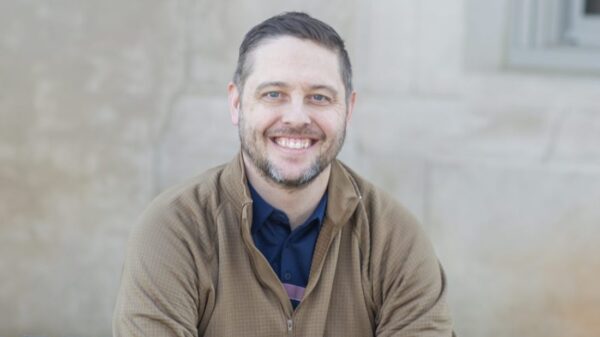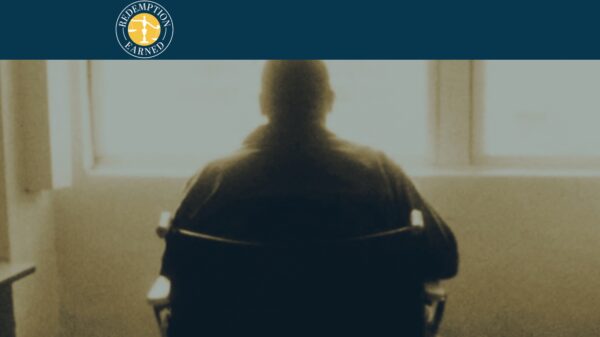Robert “Buddy” Metcalf grew up in Opp in the 1950s and ‘60s. Born in 1954, Buddy saw the textile industry thrive, and then suffocate, in this rural, South Alabama town. He saw much more than that, too.
“When I was 15 years old, I saw two men come out of The Bungalow, a local juke joint,” Buddy recalled. “They exchanged words, and one man pulled a knife and stabbed the other in the heart. I heard him breathe his last breath. I’ll never forget what that sound did to me.”
Buddy cooperated with the police investigation, and the man who committed the murder was arrested, prosecuted and convicted for murder. He was the only witness to the crime. “At 15, I can promise you there were a lot of other things I would have rather been doing. But something inside of me told me to ‘do the right thing.’ So, I did. Scared to death, but I identified the murderer.”
Some years later, Buddy’s brother, Johnny Ray Metcalf, would become the chief of police in Opp. Buddy sometimes wonders how that murder he witnessed as a teenager affected the rest of his life and how it might have affected his brother’s, too.
“I don’t think it’s a coincidence that my brother went into a profession where he was protecting and serving. That was how we were raised. I also don’t think it was a coincidence that, as close as we were growing up, he was drawn to a career where he helped victims, knowing what I went through as a witness to a murder.”
Like his brother, Buddy spent a lifetime serving. He went to work full time with the National Guard in 1983. “Serving my country was the least I could do. We live in the greatest Land in the world, and I had no hesitation about giving something back.”
Buddy saw the textile industry drying up, and the opportunity to go full time with the Guard came at just the right time. “I didn’t hesitate when I was offered the job. The post was in Elba, just a few miles from home, and it was a job I knew I would enjoy. I also knew that this job with the Guard would enable me to support my family long term.
“Of course, I blew that,” Buddy lamented. “After nearly 20 years in the Guard, I was an aging man in a young man’s world. The guys I worked with were all half my age and twice as strong and twice as quick. One night, a guy I thought was my friend told me he could give me something that would make me feel like a young man again. Being a little bit too trusting and a little bit too naïve, I gladly accepted the help. That was the first time I ever did methamphetamine.”
From there, Buddy’s life quickly spiraled out of control. The slaveowner that is methamphetamine quickly conquered his resistance, and he was severely addicted. “It wasn’t long before everything I did revolved around my methamphetamine addiction. I abandoned my kids. I abandoned my wife. I lost my job. I lost my car. I lost my house. I lost everything. At the ripe old age of 49 years old, all I had left was a methamphetamine addiction.”
Soon enough, Buddy’s addiction brought him back in contact with the law. However, this time he was not a witness, nor was his brother involved. Buddy was arrested on Christmas Day, 2000, for trafficking in methamphetamine. “That was the best Christmas present the Lord ever gave me, but I wouldn’t find the true Hope of that present until the New Year.”
Buddy was stopped for an expired tag, and the officer observed drugs and drug paraphernalia in plain view while talking to Buddy through the driver-side window. Later, a search of the car led to the discovery of a meth lab and trafficking weight of methamphetamine oil in the car.
“I was in bad shape,” Buddy said. “Not because I had been arrested — although that wasn’t good — but because the only thing I had to my name was an old, beat-up, four-door sedan. And the reason it was so important to me was because it gave me a way to hide my meth lab. I cooked for myself. I did it to support my own addiction. At that point in my life, my addiction was the only thing that was important to me.”
Two years later, Buddy pled guilty. The court decided to give Buddy a second chance and put him on probation. According to his plea agreement, Buddy was to complete “the court drug rehabilitation program” as part of his probation.
“I wasn’t ready, though,” Buddy recalled. “I had not truly changed my life, even though I had done my best to convince the judge that I had. Looking back on it now, I see the bigger picture. I played a game the first time I got arrested, but I was miserable. I was praying to a God that I didn’t believe in, and I did not want to do life anymore.”
God answered Buddy’s prayer, he says, on April 8, 2003. Less than a year after the court had given Buddy a second chance, he was arrested again for possessing methamphetamine. “I remember thanking the police officer as he took me to jail. I knew he had saved my life.”
Because Buddy was on probation for the first offense, he now faced a serious problem: A new, young prosecutor sought to revoke Buddy’s probation. “He could’ve put me in prison for a really long time.” Buddy had a 15-year prison sentence hanging over his head. If his probation was revoked, he would have to serve that time. Plus, he also faced new felony charges thatcould also lead to incarceration.
“But the Lord was already doing His work for me. You see, that new, young prosecutor was also a strong believer and a strong advocate for rehabilitation. So was the judge that was assigned to my case.”
In 2003, I was that new, young prosecutor in Covington County, hired exclusively to handle drug cases and the growing plague that is methamphetamine.
My prosecutorial ideology is that sometimes the best way to “fix” a problem is to put somebody in prison. Other times, I think that rehabilitation or education are the best fix. Whatever the case may be, though, I think my calling is to try to help people fix the problem. That’s the approach I took with Buddy.
“He held me accountable,” Buddy said. “We struck a deal where I would have to serve nine months in jail, but then he also made me commit to go to a yearlong residential rehab program. The judge signed off on that deal, and that was the day that I began to unwrap the Hope that was hidden inside that ‘best Christmas present’ I had ever received.”
Buddy served his time and, all the while, kept in contact with me. We formed an unusual relationship that has stood the test of time.
“Walt helped me get into The Shoulder in Baldwin County. He wrote me a letter of recommendation. I know I never would’ve gotten in were it not for the things he did to help me. But I also know that had he not made me serve some time, I probably would have simply thought, ‘I beat the system again.’ Holding me accountable and helping me is what humbled me enough to see what I had done to destroy my life and the lives of the people around me.”
After spending a year in The Shoulder residential rehabilitation program, Buddy graduated. He had done so well as a client that The Shoulder offered him a job.
“Walt and Judge (Ashley) McKathan combined to save my life. They saved me from addiction,” Buddy said. “However, The Shoulder gave me the tools that I needed to live free of the bondage of that addiction and gave the best of my life back to me.
“Most importantly, though, it was through that year or so of my life that Jesus heard my cries of desperation. He didn’t mind taking those nail-scarred hands and reaching down into the sewage that was my life. He cleaned me up and planted me firmly on His rock. And that is the Hope that was contained inside that Christmas present. It just took me a while to find it.”
Buddy spent the next 15 years working at The Shoulder. He restored his relationship with his daughter, married his second wife, his beloved Reva, and devoted a second career to helping others. He realized his life came full circle. “I started out doing the right thing. I got a little distracted along the way, but I hope and I pray that I ended up where the Lord wanted me –helping others. Lord knows others certainly helped me along the way so that I could get here.”
Buddy and I are still good friends. Through the years, we have shared good times and bad together. My own brother suffered from addiction. I called on Buddy to be his counselor. He answered the call without hesitation, and he helped my brother and saw him to his own graduation from The Shoulder. Ours is truly a unique story. I love him like he’s my own blood brother.
Though he’s retired, Buddy has not lost his desire to help others. Neither have I, now in my 16th year as a prosecutor. I spent a few years in private practice before I was elected as district attorney. I still hold the same ideology: Some folks need prison; others need help. So, I teach addiction recovery classes at Crossover Ministry, a residential addiction recovery program in Buddy’s hometown of Opp. I’ve been volunteering at Crossover for almost as long as I’ve been a prosecutor.
Buddy and I had lunch recently at a local eatery. I already have him committed to helping me some at Crossover.
“Maybe someone else needs to find the Hope of a new year, too,” Buddy said with a grin.





















































